572 David Gries
|
us us web page I was born in Flushing, New York, and spent 21 years there before I escaped. I received a B.S. Queens College in 1960 and went to work for the U.S. Naval Weapons laboratory (as a civilian) as a mathematician-programmer. I met my wife-to-be, Elaine, a few months later, and we were married in November 1961. We went to Illinois for more education. I received a Masters degree in math from Illinois in 1963. My assistantship was to help two Germans, Manfred Paul and Ruediger Wiehle, write a full Algol compiler for the IBM 7090 computer --it was fun, figuring out how to implement recursion efficiently before there were many papers on the topic. This ended up in my wife and I going to Munich for almost three years. I received my doctorate under F.L. Bauer and Joseph Stoer from MIT (the Munich Institute of Technology, Germany) in June 1966. This was in math, or numerical analysis, since computer science theses were not yet kosher. I was an assistant professor of Computer Science at Stanford from 1966 to 1969. While at Stanford, our twins Paul and Susan were born. What made it more exciting than usual was that they were born on the birthday of myself and my twin --26 April. So, when my twin is in town, Elaine makes four birthday cakes. We left Stanford because it had no weather. We moved to Cornell, which has weather, in 1969 and have been snowed in ever since. I was Department Chair in 1982-87, and I became the William L. Lewis Professor of Engineering in 1992. I had a Guggenheim Fellowship in 1984-85. I am better known for my text writing and my contributions to education than on the wonderfulness of my research. Do what you are good at; bloom where you are planted. I have received a number of awards for contributions to education: the 1994 IEEE Taylor L. Booth Award, the ACM SIGCSE award in 1991, a Cornell Outstanding Educator Award in 1990, the Clark Award from Cornell's College of Arts & Sciences in 1986, and the American Federation of Information Processing Societies' (AFIPS) education award in 1985. I am proud of all my Ph.D. advisees, but two stand out. Susan Owicki's thesis laid the foundation for proofs of correctness of parallel programs, with the notion of interference-freeness. A paper co-authored by us on the topic won the 1977 ACM Award for best paper in programming langauges and systems. And T.V. Raman's thesis just won the ACM best-dissertation award for 1993-94. Raman designed and implemented a system for "speaking" any tex/latex document, including technical articles and books. The same document can be printed or spoken. Being able to speak mathematics in an effective manner was an important goal of his work. Reading for the Blind is already using his system to produce audio cassettes. I served as Chair of the Computing Research Association (then the Computer Science Board) in the late 1980's when it opened its office in Washington and began seriously to represent computing research interests. I also conducted the Taulbee Surveys in the period 1984-1991 and am proud of obtaining essentially complete responses from PhD-granting computer science departments during that period. No other comparable survey has had such a response rate. One year, it required only 256 telephone calls to get the 150 departments to send in their questionnaires. I received the Computing Research Association's 1991 Service Award for this work on the Surveys and for chairing the Association during its move toward respectability and responsibility. I am currently editor for IPL, Acta Informatica, Formal Aspects of Computing, and Software Concepts and Tools. This editing keeps me busy, but I enjoy it. I try to take an interest in individual papers, when I know the area, and will suggest substantial rewrites myself when I believe it will help. Serve where you can best serve. Fred B. Schneider and I are co-editors of Springer Verlag Texts and Monographs in Computer Science. What do I do in my spare time? It used to be sports like golf, softball, volleyball, swimming and table tennis. (Once, in China, I split my pants playing ping pong. An hour later, while giving a lecture, I mentioned that the audience should not laugh when I turned around, and I explained why. The interpreter spoke, and everyone laughed. However, I don't know whether he told the truth or just said, "Gries made a joke, laugh.".) I also used to sing barbershop and Gilbert and Sullivan. And working around the house --carpentry, wiring, remodeling-- has taken a lot of time and yielded considerable satisfaction. |


|
Languages: |